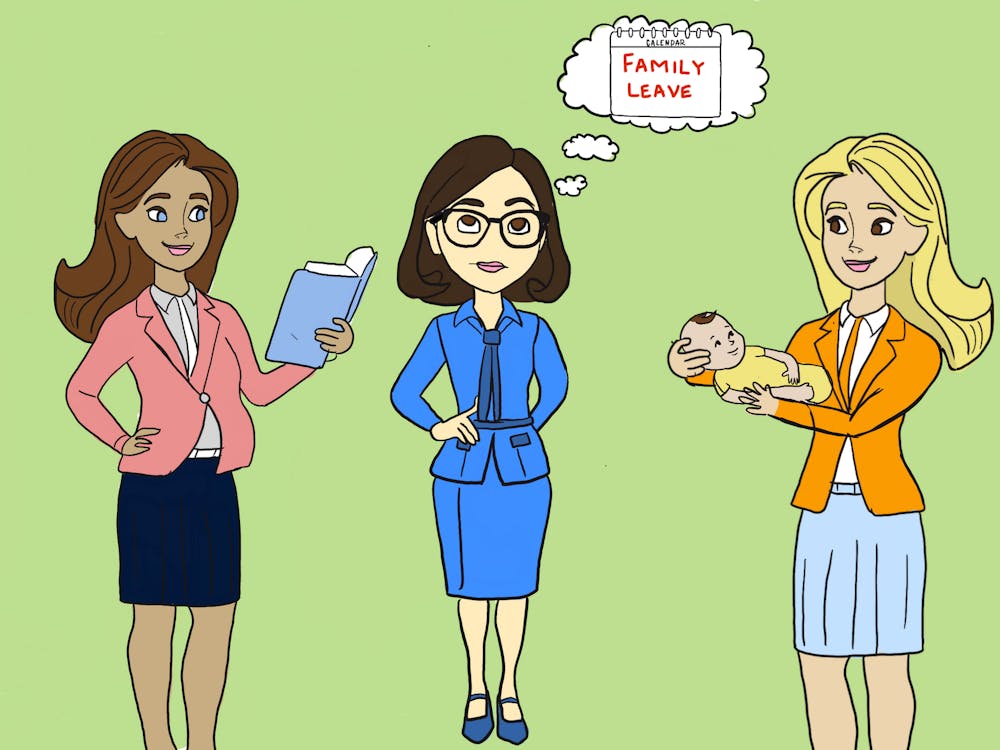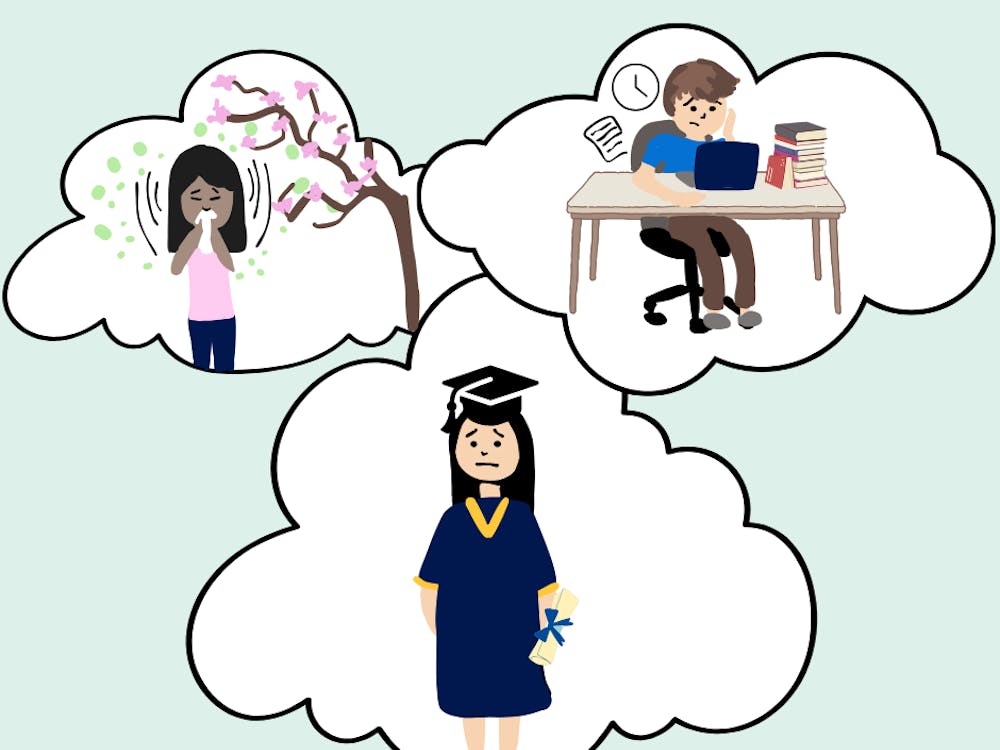Rarely have two words caused such controversy in the University community. However, the addition of the chant "not gay" to the University's "Good Ol' Song" has created a ferment of opinions, campaigns and editorials from those defending or criticizing it.
The University's chapter of the American Civil Liberties Union, nationally a group motivated by defending individual rights and liberties, recently launched its own effort to eradicate the chant.
Five black and white flyers read: "not gay," "not black," "not Asian," "not female" and "not Jewish." A picture of a person meant to represent one of the respective characteristics stares out at passersby.
"We wanted to show people that saying a racial slur like 'not black' is analogous to saying 'not gay,'" said third-year College student Andrew Borchini, president of the University's ACLU. "Our main purpose in putting the flyers up is to bridge the gap between peoples' abstract ideas and concrete concepts."
Borchini said he hopes the flyers' brash statements make people realize that "not gay" is a prejudiced statement. He is very optimistic about the flyer campaign and said he believes the response has been very positive and supportive.
"One African-American female told me that before she saw the flyers, the 'not gay' chant wasn't that big a deal," Borchini said. "But after she saw the flyers, in particular, the 'not black' flyer, she said that she would have felt extraordinarily ostracized from the community had people been saying racial slurs at the football game."
Borchini said he believes Student Council is doing a great job with its movement against the "not gay" chant, but that the ACLU is more confrontational.
"We're more in your face," he said. "The committee is more subtle but equally as important."
Council has formed a special committee to encourage students to talk one-on-one with their peers about ending the chant.
Fourth-year College student Abby Fifer, the Student Council president, said she is glad to see that other students at the University care about the issue enough to launch their own campaign. As opposed to the ACLU's campaign, the Student Council's campaign against the "not gay" chant consists of one-on-one discussion - an approach that Fifer admits is less confrontational than the ACLU's flyers.
"The ACLU's flyers show a different message than the Student Council's message," Fifer said. "The Student Council advocates an open exchange of ideas without judgment and the flyers seem to support a particular opinion."
The Student Council "got a lot of slack about being wishy-washy," Fifer said. "But the Student Council specifically avoided the approach that the ACLU seems to be taking because we wanted to avoid a knee-jerk reaction from students."
Fifer said she thinks students understand that the ACLU and the Student Council are two different organizations, and that their approaches in fighting against the "not gay" chant will also differ.
Not all people in the University community have found ACLU's flyer campaign to be effective. Second-year College student Sonny Bunch said he does not support the campaign, although he does not participate in the chant at football games.
"It really shows the hypocrisy of the ACLU more that anything else," Bunch said. "Here at school, the student government is trying to tell people what they can or can't say. In any other situation, the ACLU would be opposed to it."
The national ACLU is known for championing free speech, yet Borchini said he does not feel that the University chapter's campaign is a contradiction of this standard. He does not think that ending the "not gay" chant is an infringement on the right to free speech.
"If the Student Council or anyone else enacted some sort of law that punished people for saying the chant, the ACLU would be the first to oppose those measures," Borchini added.
Bunch holds that trying to end the use of the chant does have to do with free speech.
"They are trying to say the chant's socially unacceptable," Bunch said, adding that when he first saw the flyers he laughed. "When I found out it was by the ACLU, I laughed even harder. They should not be on this side of the issue."
Bunch added that he does not believe that a campaign of this type is inherently wrong, just that the ACLU is the wrong group to do it.
"If the LGBTU were putting up the signs, that would be one thing, it would be the segment of the population they are standing for," he said.
In addition to believing the ACLU should not attempt to eradicate the chant, Bunch does not agree with the comparisons the campaign attempts to make.
"It's a completely different situation," Bunch said. "Sexual orientation is a lifestyle choice. Race and gender, that's genetic and something you can't handle."
Although Bunch does not advocate anything as drastic as tearing down the flyers, he does not find the campaign necessary or effective. He attributes recent reduction in the "not gay" chant to the Sept. 11 attacks.
"I never thought it [the chant] was so bad," he said. "To begin with it's definitely gotten quieter but I wouldn't say that's because of the ACLU or student government efforts."
Third-year College student Corbin Martin would disagree and believes so strongly in the message of the campaign that she posed for the "not female" flyer. Martin, though not a member of the ACLU, said she got involved in the campaign because many people who participated in the chant might not realize the impact it has on certain people. She said she believes the flyers target that particular part of the University population.
"I don't think people are saying it because they are anti-gay," Martin said. "The message [of the campaign] is it may be a fun thing for you to say, but it really does impact people."
The approach the ACLU has taken, she said, is very effective.
"Making it more personal and putting faces to the discrimination makes it more real," Martin said. "Not gay is the same thing as looking at a black person and saying 'not black.' Saying 'not gay' is the same as any other kind of discrimination."
First-year College student Adam Gustafson does not support the ACLU's campaign.
"The posters are intended to show some sort of solidarity between minority groups, and that isn't necessarily there," Gustafson said. "I'm sure there are members within those groups depicted that do not feel any communality with homosexuals."
He also believes the flyers classify the groups depicted as victims.
The posters "perpetuate a feeling of victimization among groups which in many cases isn't really there," he said. "I can imagine there would be some people offended by being classified as victims."
Although Gustafson said he views the "not gay" chant as "tacky and a perversion of tradition," he does not believe the campaign will be successful.
"It seems to argue for a reasoned reaction to the 'not gay' chant, but the people chanting 'not gay,' they don't seem like the reasonable type to me," he said. "You can't change a herd mentality from the outside."
Gustafson added that umbrella organizations like the ACLU do not have the power to change people's minds on this issue, and he does not believe that the campaign will have any noticeable effect on the saying of the "not gay" chant.
Despite criticisms such as Gustafson's, Borchini said the ACLU plans to continue the campaign and will soon convene and decide whether another round of flyers is necessary. He does show concern at the problem of people tearing down the signs as soon as they are posted. In any event, many flyers from the first posting on Oct. 22 still can be seen taped onto Lawn room doors.
The real force behind the campaign, Borchini added, is that "everyone in our University community deserves to be treated with dignity"






